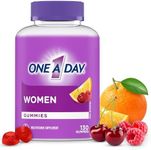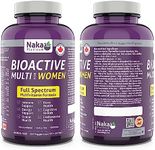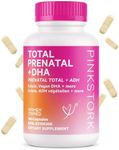Buying Guide for the Best Multivitamins For Women
Choosing the right multivitamin for women can feel overwhelming with so many options available. The key is to focus on your individual health needs, lifestyle, and any specific gaps in your diet. Multivitamins are designed to supplement your nutrition, not replace a balanced diet, so it's important to look for a product that complements your daily intake. Always consider your age, activity level, and any health conditions you may have, as these factors can influence which nutrients are most important for you.Vitamin and Mineral ContentThis refers to the types and amounts of vitamins and minerals included in the multivitamin. It's important because different life stages and lifestyles require different nutrients. For example, women of childbearing age may need more iron and folic acid, while older women may benefit from more calcium and vitamin D. When comparing products, look at the label to see which nutrients are included and in what amounts. If you have specific health concerns or dietary restrictions, choose a multivitamin that addresses those needs.
Formulation (Age and Life Stage)Multivitamins are often tailored for different age groups and life stages, such as teens, adults, pregnant women, or seniors. This is important because nutrient needs change over time. For example, postmenopausal women may need less iron but more calcium and vitamin D. Select a formulation that matches your current age and life stage to ensure you're getting the right balance of nutrients.
BioavailabilityBioavailability refers to how easily your body can absorb and use the nutrients in the multivitamin. Some forms of vitamins and minerals are more easily absorbed than others. For example, calcium citrate is more easily absorbed than calcium carbonate. If you have digestive issues or want to maximize absorption, look for products that use highly bioavailable forms of nutrients.
Additives and FillersMany multivitamins contain extra ingredients like artificial colors, flavors, preservatives, or fillers. These are not necessary for nutrition and may be best avoided, especially if you have allergies or sensitivities. If you prefer a cleaner product, look for multivitamins labeled as free from unnecessary additives.
Dosage FormMultivitamins come in various forms, such as tablets, capsules, gummies, or powders. The form can affect how easy it is to take and how well your body absorbs the nutrients. If you have trouble swallowing pills, gummies or powders might be a better choice. Consider your preferences and any dietary restrictions (like gelatin in gummies) when choosing the form.
Frequency and Serving SizeThis refers to how often you need to take the multivitamin and how many pills or servings are required each time. Some products are once-daily, while others may require multiple doses. If you prefer a simple routine, a once-daily option may be best. Always check the serving size to ensure it fits your lifestyle and is easy to remember.


















